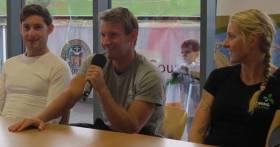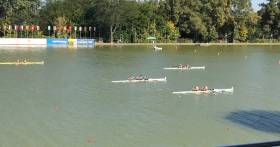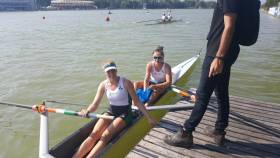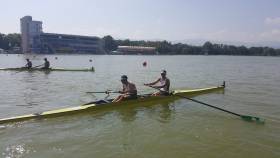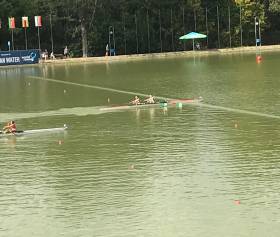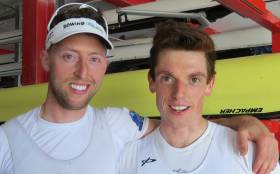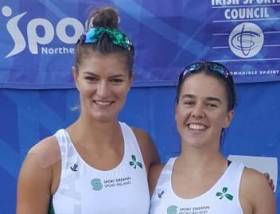Displaying items by tag: Ireland
#Rowing: Ireland crews reached multiple A Finals and had two fifth-place finishes at the World Coastal Rowing Championships in Sidney, Victoria in Canada.
The Myross men’s coxed quadruple of Kenny McCarthy, Vincent Browne, Andy O’Sullivan and James Lupton, with cox Ciara Deasy, finished fifth in their A Final. The race was won by Italy, who were well clear of second-placed Monaco, with France One taking bronze.
In the final of the men’s single, Patrick Boomer was also well placed behind the winner Eduardo Linares Ruiz. The Peruvian took the lead before half way and held on to dethrone Italy’s defending champion, Simone Martini, who took bronze. Lars Wichert of Germany was second.
Boomer, who was representing Loughros Point of Donegal, was fifth, well in touch with the medallists.
Ireland's women's crews also did well. Castletownbere's coxed quad of Emily Dulohery, Cliona O'Regan, Orla Gilsenan, Miriam Sheehan and cox Carmel Connolly finished sixth. Russia won from Spain and Monaco.
Diana Dymchenko of the Ukraine won the women’s single. Sionna Healy of Arklow was eighth and Laura O’Neill of Kilmacsimon 12th.
World Coastal Rowing Championships, Sidney, Victoria, Canada (Selected Results; Irish interest)
Men
Quadruple, coxed: 1 Italy (CC Saturnia) 22 mins 14 secs, 2 Monaco, 3 France One; 5 Myross, Ireland (K McCarthy, V Browne, A O’Sullivan, J Lupton; cox: C Deasy) 23:46.9.
Single: 1 Peru (E Linares Ruiz) 26:30.2, 2 Germany Two, 3 Italy; 5 Ireland One, Loughros Point (P Boomer) 27:23.4.
Women
Quadruple, coxed: 1 Russia 25:18.0, 2 Spain One, 3 Monaco; 6 Castletownbere, Ireland (E Dulohery, C O’Regan, O Gilsenan, M Sheehan; cox: C Connolly) 27:56.
Single – 1 Ukraine (D Dymchenko) 28:56.7, 2 Netherlands, 3 France Two; 8 Ireland One (S Healy, Arklow) 31.38.2; 12 Ireland Three (L O’Neill, Kilmacsimon) 33:25.1.
O'Donovan Brothers & Puspure Chosen as Afloat Rowers of Month
#Rowing: Ireland’s gold medallists at the World Championships, Paul and Gary O’Donovan and Sanita Puspure, are the Afloat Rowers of the Month for September.
The whole Ireland team performed with merit at the regatta in Plovdiv in Bulgaria and there were a number of outstanding placings. The men’s lightweight quadruple reached their A Final, while Philip Doyle and Ronan Byrne finished ninth overall in the men’s double sculls.
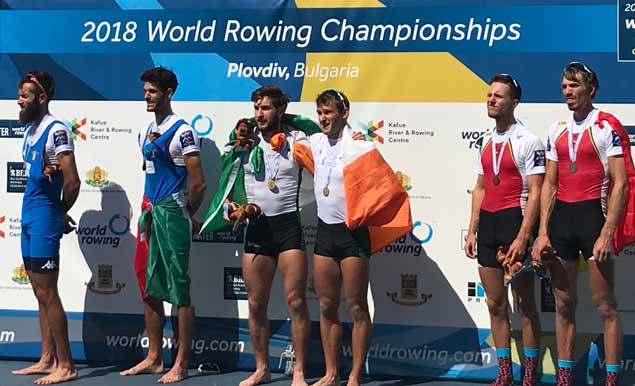 Gary and Paul on the podium in Plovdiv with Italy and Belgium Photo: Liam Gorman
Gary and Paul on the podium in Plovdiv with Italy and Belgium Photo: Liam Gorman
The women’s pair of Aifric Keogh and Emily Hegarty swept into the A Final, one of the real shocks of the Championships. They took sixth.
The O’Donovan brothers had to battle through a terrible lane draw on the Wednesday to reach Thursday’s semi-final. It left them tired and they made it through to the final by taking the third qualification place in the semi-final with just 1.52 seconds to spare over Poland. Come the final it was a step up; a step into history. They made light of their outside lane with a sweet and powerful row they deemed their best ever as a lightweight double. Italy could not live with it and Ireland had won their first ever gold medal in an Olympic event at a World Championships.
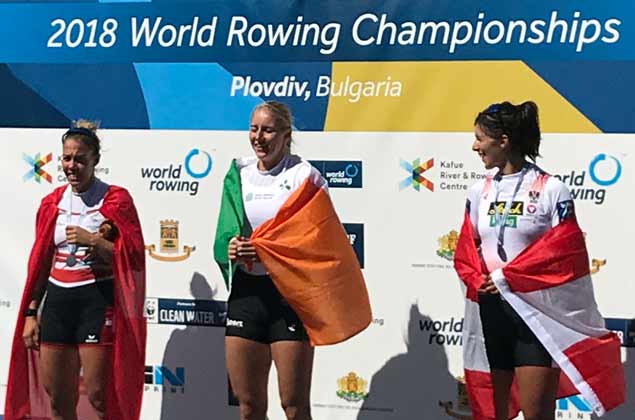 Sanita Puspure on the podium in Plovdiv Photo: Liam Gorman
Sanita Puspure on the podium in Plovdiv Photo: Liam Gorman
The women’s single sculls has been a fascinating event for years. Australia’s Kim Crow (now Brennan) was the star who shone all the way to a golden show in Rio in 2016; latterly Switzerland’s Jeannine Gmelin has been a winner. And now the time had come for Ireland’s Sanita Puspure. She won the heat and the semi-finals with elan, as if impatient to take on and beat Gmelin. She did this despite having to deal with choppy conditions in the final and she clipped a buoy. However, Puspure was never headed from early on, and she won with over two lengths to spare. For seven minutes and 20.12 seconds she was, indeed, dominant.
Congratulations to all the Ireland teams this season and to the Afloat Rowers of the Month, Sanita Puspure and Paul O’Donovan and Gary O’Donovan.
Rower of the Month awards: The judging panel is made up of Liam Gorman, rowing correspondent of The Irish Times and David O'Brien, Editor of Afloat magazine. Monthly awards for achievements during the year will appear on afloat.ie. Keep a monthly eye on progress and watch our 2018 champions list grow.
World Championship Gold for Puspure and Ireland
#Rowing: Sanita Puspure won Ireland’s second gold medal at the World Rowing Champinships at Plovdiv in Bulgaria today. She grabbed the lead in the single sculls final right from the start and never let it go. Defending champion Jeannine Gmelin moved to catch her in the third quarter, but the Ireland sculler stayed strong and extended her lead. She tired a little in the final quarter – and grew her advantage even more. She was clear by over two lengths at the finish.
World Rowing Championships, Plovdiv, Bulgaria, Day Eight (Irish interest):
Men
Double Sculls – B Final (Places 7 to 12): 1 Netherlands 6:05.10, 2 Poland 6:05.10, 3 Ireland (P Doyle, R Byrne) 6:08.81.
Women
Double Sculls – C Final (Places 13 to 18): 1 Ireland (M Dukarska, A Crowley) 6:54.55, 2 Chile 6:57.29, 3 Italy 6:58.17.
Single Sculls – A Final: 1 Ireland (S Puspure) 7:20.12, 2 Switzerland (J Gmelin) 7:25.93, 3 Austria (M Lobnig) 7:29.51.
Doyle and Byrne Ninth at World Rowing Championships
#Rowing: Philip Doyle and Ronan Byrne took ninth in the world in the men’s double at the World Rowing Championships here in Plovdiv, Bulgaria. The Ireland crew finished third in their B Final behind the Netherlands and Poland. They tucked in behind those duelling crews – there was only .35 of a second between them on the line. Ireland did push up to try to break into the top two but finished more than a boat length behind them, but well clear of the other three crews.
World Rowing Championships, Plovdiv, Bulgaria, Day Eight (Irish interest):
Men
Double Sculls – B Final (Places 7 to 12): 1 Netherlands 6:05.10, 2 Poland 6:05.10, 3 Ireland (P Doyle, R Byrne) 6:08.81.
Women
Double Sculls – C Final (Places 13 to 18): 1 Ireland (M Dukarska, A Crowley) 6:54.55, 2 Chile 6:57.29, 3 Italy 6:58.17.
Dukarska and Crowley Win C Final at World Rowing
#Rowing: Ireland started the final day of the World Rowing Championships in Bulgaria in winning fashion. Monika Dukarska and Aileen Crowley dominated their C Final, winning by a length from Chile. This places the Ireland crew 13th in the world.
The strong winds prompted the organisers to redraw the lanes. The water was also visibly choppier than in recent days.
World Rowing Championships, Plovdiv, Bulgaria, Day Eight (Irish interest):
Women
Double Sculls – C Final (Places 13 to 18): 1 Ireland (M Dukarska, A Crowley) 6:54.55, 2 Chile 6:57.29, 3 Italy 6:58.17.
Sixth Place for Hegarty and Keogh in World Rowing Final
#Rowing: Ireland finished sixth in the A Final of the women’s pair at the World Rowing Championships in Plovdiv, Bulgaria. New Zealand and Canada covered the first 500 metres best, but Aifric Keogh and Emily Hegarty passed through that mark at the back of the field. The pattern of the race developed in the same way: Canada came through New Zealand by the finish, and the two took gold and silver. Spain won a battle with Italy to take bronze. Keogh and Hegarty skirmished with China coming into the closing stages but eventually took the final spot.
World Rowing Championships, Plovdiv, Bulgaria, Day Seven (Irish interest):
Women
Pair – A Final: 1 Canada 6:50.67, 2 New Zealand 6:52.96, 3 Spain 7:04.60; 6 Ireland (A Keogh, E Hegarty) 7:15.70.
Good Start but Doyle and Byrne Miss Out on A Final at World Championships
#Rowing: Ireland’s Philip Doyle and Ronan Byrne took fifth in their semi-final at the World Rowing Championships in Plovdiv, Bulgaria this morning. They will compete in the B Final for places six to 12. The top three took A Final places and Ireland actually led through the first 500 metres. Britain’s Angus Groom and Jack Beaumont took over the lead and built it. They would go on to win. The Irish crew were still their nearest challengers at halfway, but from there New Zealand took over in second and held it. Ireland stayed well in it, but were passed by Romania and Poland. The Romanians took third.
In the first race of the day, the Britain women’s eight squeaked through to the A Final by taking the fourth of four qualification places in their repechage – by .16 of a second from New Zealand. Rebecca Shorten from Belfast is the stroke woman for the crew.
World Rowing Championships, Plovdiv, Bulgaria, Day Six (Irish interest)
Men
Double – Semi-Final One (First Three to A Final; rest to B Final): Britain 6:06.59, 2 New Zealand 6:08.00, 3 Romania 6:08.17; 5 Ireland (P Doyle, R Byrne) 6:10.95.
Women
Eight – Repechage (First Four to A Final): 4 Britain (8 R Shorten) 6:04.63.
Casey and Walsh Win C/D Semi-Final at World Rowing
#Rowing: Aoife Casey and Denise Walsh won their C/D Semi-Final and qualfied for the C Final at the World Rowing Championships in Plovdiv today. The first two would go to the C Final, and it was clear early in the race that these would be Spain and Ireland. Thailand trailed this two. Spain led and looked set to win – but Casey and Walsh won the battle at the head of the field with Spain.
World Rowing Championships, Plovdiv, Bulgaria, Day Five (Irish interest)
Men
Pair – Quarter-Final Four (Three to A/B Semi-Finals; rest to C/D Semi-Finals): 1 Canada 6:26.04, 2 New Zealand 6:30.36, 3 Czech Republic 6:35.01; 5 Ireland (M O’Donovan, S O’Driscoll) 6:44.28.
Double Sculls – Repechage Four (First Two to A/B Semi-Final):
Ireland (P Doyle, R Byrne) 6:16.96, 2 Bulgaria 6:20.15.
Lightweight Double – Semi-Final Two (Three to A Final; rest to B Final): 1 Italy 6:21.94, 2 Belgium 6:22.83, 3 Ireland (G O’Donovan, P O’Donovan) 6:23.78.
Women
Pair – Semi-Final (Three to A Final; rest to B Final): 1 Ireland (A Keogh, E Hegarty) 7:14.67, 2 Italy 7:14.99, 3 Spain 7:15.30.
Lightweight Double Sculls – C/D Semi-Final (First Two to C Final; rest to D Final): 1 Ireland (A Casey, D Walsh) 7:20.51, 2 Spain 7:24.08.
O'Donovan and O'Driscoll Fifth in Quarter-Final at World Championships
#Rowing: Shane O’Driscoll and Mark O’Donovan took fifth in their quarter-final of the pair at the World Rowing Championships in Plovdiv. Canada won well, with New Zealand and the Czech Republic taking the other A/B semi-final places. The Ireland crew battled well to push ahead of Denmark, but third and qualification for the A/B Semi-Finals was beyond them. They will compete in the C/D Semi-Finals.
Earlier, Philip Doyle and Ronan Byrne had won their repechage of the double sculls to secure their place in the A/B Semi-Finals.
World Rowing Championships, Plovdiv, Bulgaria, Day Five (Irish interest)
Men
Pair – Quarter-Final Four (Three to A/B Semi-Finals; rest to C/D Semi-Finals): 1 Canada 6:26.04, 2 New Zealand 6:30.36, 3 Czech Republic 6:35.01; 5 Ireland (M O’Donovan, S O’Driscoll) 6:44.28.
Double Sculls – Repechage Four (First Two to A/B Semi-Final):
Ireland (P Doyle, R Byrne) 6:16.96, 2 Bulgaria 6:20.15.
Crowley and Dukarska Miss Out at World Championships
#Rowing: Ireland’s Monika Dukarska and Aileen Crowley finished fifth in their repechage and missed out on the A/B semi-finals of the double sculls at the World Rowing Championships in Plovdiv, Bulgaria. The race featured a very close finish, with the Czech Republic overtaking the long-time leaders, Germany, on the line while Poland pulled out an outstanding sprint to take the crucial third place away from Chile. Ireland will go to the C/D semi-finals.
World Rowing Championships, Plovdiv, Bulgaria, Day Four (Irish interest)
Men
Lightweight Quadruple Sculls – Repechage One (First Two to A Final): 1 Turkey 5:51.12, 2 Ireland (F McCarthy, R Ballantine, J McCarthy, A Goff) 5:54.09
Women
Double Sculls – Repechage Three (First Three to A/B Semi-Finals): 1 Czech Republic 7:00.07, 2 Germany 7:00.30, 3 Poland 7:00.48; 5 Ireland (M Dukarska, A Crowley) 7:03.48



























